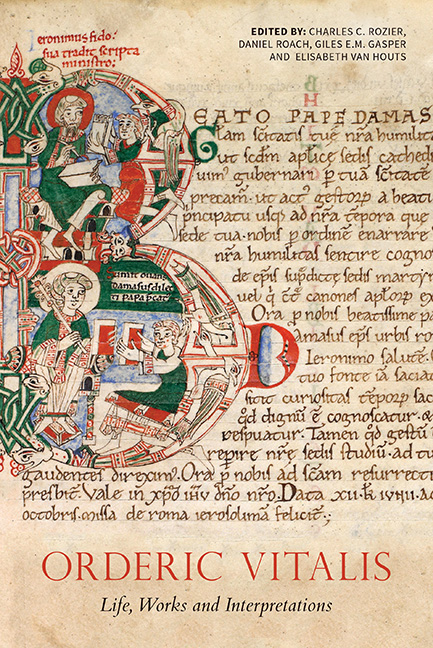Book contents
- Frontmatter
- Dedication
- Contents
- List of Illustrations
- Acknowledgements
- List of Abbreviations
- Chronology of the Lives of Odelerius and his Son Orderic Vitalis
- Composition of the Historia ecclesiastica
- Introduction: Interpreting Orderic Vitalis
- Orderic and his Father, Odelerius
- Following the Master's Lead: The Script of Orderic Vitalis and the Discovery of a New Manuscript (Rouen, BM, 540)
- Orderic Vitalis as Librarian and Cantor of Saint-Évroul
- Saint-Évroul and Southern Italy in Orderic's Historia ecclesiastica
- Orderic and English
- Inscriptions in Orderic's Historia ecclesiastica: A Writing Technique between History and Poetry
- Reading Orderic with Charters in Mind
- Orderic Vitalis and the Cult of Saints
- Orderic's Secular Rulers and Representations of Personality and Power in the Historia ecclesiastica
- Worldly Woe and Heavenly Joy: The Tone of the Historia ecclesiastica
- Orderic Vitalis, Historical Writing and a Theology of Reckoning
- Jesus Christ, a Protagonist of Anglo-Norman History? History and Theology in Orderic Vitalis's Historia ecclesiastica
- ‘Studiosi abdita investigant’: Orderic Vitalis and the Mystical Morals of History
- Meanders, Loops, and Dead Ends: Literary Form and the Common Life in Orderic's Historia ecclesiastica
- Orderic and the Tironensians
- ‘One single letter remained in excess of all his sins …’: Orderic Vitalis and Cultural Memory
- The Reception of Orderic Vitalis in the Later Middle Ages
- Appendix 1 Archaeological Investigations at the Abbey of Saint-Évroult-Notre-Dame-des-Bois
- Appendix 2 Descriptive Catalogue of Manuscripts Featuring the Hand of Orderic Vitalis
- Select Bibliography
- List of Manuscripts Cited
- General Index
Worldly Woe and Heavenly Joy: The Tone of the Historia ecclesiastica
Published online by Cambridge University Press: 25 October 2017
- Frontmatter
- Dedication
- Contents
- List of Illustrations
- Acknowledgements
- List of Abbreviations
- Chronology of the Lives of Odelerius and his Son Orderic Vitalis
- Composition of the Historia ecclesiastica
- Introduction: Interpreting Orderic Vitalis
- Orderic and his Father, Odelerius
- Following the Master's Lead: The Script of Orderic Vitalis and the Discovery of a New Manuscript (Rouen, BM, 540)
- Orderic Vitalis as Librarian and Cantor of Saint-Évroul
- Saint-Évroul and Southern Italy in Orderic's Historia ecclesiastica
- Orderic and English
- Inscriptions in Orderic's Historia ecclesiastica: A Writing Technique between History and Poetry
- Reading Orderic with Charters in Mind
- Orderic Vitalis and the Cult of Saints
- Orderic's Secular Rulers and Representations of Personality and Power in the Historia ecclesiastica
- Worldly Woe and Heavenly Joy: The Tone of the Historia ecclesiastica
- Orderic Vitalis, Historical Writing and a Theology of Reckoning
- Jesus Christ, a Protagonist of Anglo-Norman History? History and Theology in Orderic Vitalis's Historia ecclesiastica
- ‘Studiosi abdita investigant’: Orderic Vitalis and the Mystical Morals of History
- Meanders, Loops, and Dead Ends: Literary Form and the Common Life in Orderic's Historia ecclesiastica
- Orderic and the Tironensians
- ‘One single letter remained in excess of all his sins …’: Orderic Vitalis and Cultural Memory
- The Reception of Orderic Vitalis in the Later Middle Ages
- Appendix 1 Archaeological Investigations at the Abbey of Saint-Évroult-Notre-Dame-des-Bois
- Appendix 2 Descriptive Catalogue of Manuscripts Featuring the Hand of Orderic Vitalis
- Select Bibliography
- List of Manuscripts Cited
- General Index
Summary
The last conversation I had with Marjorie Chibnall left me unsettled. We were talking, of course, about Orderic Vitalis, and she was questioning the conclusions in my book on Norman historians. There I had written that Orderic's ‘experiences as a resident in what was essentially a Norman war zone on the duchy's southern frontier, and as an acute student of the Normans’ – a treacherous people prone to violence against friends and family – ‘left him especially world-weary.’ Orderic's Historia ecclesiastica seemed to show persistent signs of the author's fatigue, pessimism, and depression. Not that anyone could blame him for that, given the world in which he lived. But Chibnall thought me mistaken. Orderic's faith and the satisfying rhythms of his monastic devotion, she suggested, guided him to a mature and balanced sensibility.
Chibnall knew Orderic and his Historia ecclesiastica better than any other reader of our age. Had I misinterpreted his work and done a disservice to its author? The Durham conference and this collection of essays have offered the welcome opportunity to reread the history with a fresh mind and make a fresh judgement, asking finally what difference tone makes in our understanding of the historian and the history he was recording and interpreting.
Orderic's earliest forays into historical writing offer tantalising signs of the direction he would take. Perhaps as early as 1095, when he was barely twenty years old, Orderic began his redaction of William of Jumièges’ Gesta Normannorum ducum, completing most of the manuscript by 1109 and adding his final interpolation in (or after) 1113. This task, along with compiling the Annals of Saint-Évroul and copying Bede's Historia ecclesiastica, trained Orderic to write history. By 1114, he was at work on his own Historia ecclesiastica.
Even as he copied William of Jumièges’ Gesta, Orderic altered the tenor of that history by adding details that darkened its tone. Some are quite brief, like the three words asserting that the French king Louis IV died ‘after many sufferings’ (‘post multos merores’). Such a slight insertion might barely register on the reader's consciousness. Yet as these bleak notices accumulate, they make their mark. Consider, for instance, Orderic's new chapters on the turmoil caused by criminals who appropriated the church of St Gervais as a storehouse for their loot.
- Type
- Chapter
- Information
- Orderic Vitalis: Life, Works and Interpretations , pp. 217 - 246Publisher: Boydell & BrewerPrint publication year: 2016



